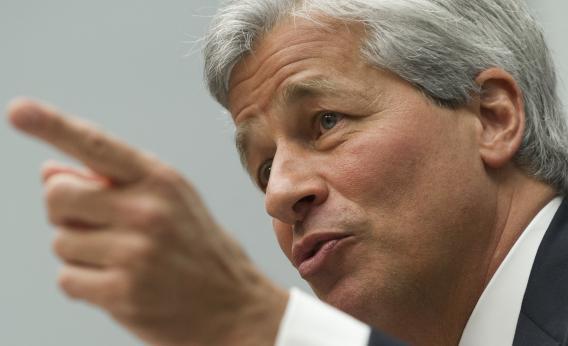JPMorgan’s solid third quarter has put Jamie Dimon back on track. The U.S. bank’s boss had $5.7 billion of profit in the quarter to crow about - a third more than a year ago. His standing took a drubbing earlier this year after dodgy hedging transactions, known as the whale trades, cost the firm about $6 billion. Now he can breathe easier. But one good report doesn’t bust the ghost of the whale.
Record mortgage production revenue, together with a 38 percent surge in investment banking fees from a year earlier, helped fuel JPMorgan’s earnings. And the Federal Reserve’s commitment to keep interest rates low could keep home finance and financial markets humming along for a few years yet.
The downside of low rates is a squeeze on the margin between a bank’s borrowing and lending. But JPMorgan is more diverse and suffered less in this regard than West Coast rival Wells Fargo, whose net interest margin shrank more than expected in its third-quarter report, sending the bank’s shares down 3.5 percent in late morning trade in New York against less than a 1.5 percent decline for JPMorgan.
There was little mention in JPMorgan’s conference calls of the whale trades, which for a few months at least transformed Dimon from the U.S. banking sector’s golden boy into an advertisement for the dangers of hubris. JPMorgan reported a $449 million loss in the third quarter on a remnant of the troubled portfolio, but Dimon declined to give specifics on positions that have been moved to its investment banking unit.
The bank’s stock price has been climbing fairly steadily toward pre-whale levels since the middle of the year. Along with the latest earnings report, that should help redeem Dimon in the eyes of his shareholders, his peers and perhaps himself. His old combative style was already on display earlier this week when he said his company did the Fed, his overall regulator, a favor by buying Bear Stearns as the financial crisis unfolded in March 2008.
Yet it would be premature for Dimon to go back, full blast, on the anti-regulation offensive. Recent concerns remain valid. JPMorgan is, if anything, getting bigger. Its total assets increased to $2.3 trillion in the third quarter and its non-deposit liabilities represent more than 6 percent of America’s GDP, the most of any U.S. bank. It still has a spread of activities that’s hard to grasp. And its stock still trades at a discount to book value. That’s the best place for the boss’s attention.
Read more at Reuters Breakingviews.
